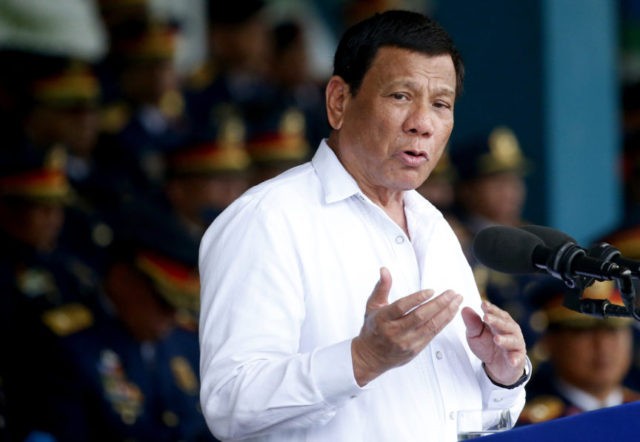Philippine President Rodrigo Duterte arrived in Japan on Tuesday to attend the International Conference on the Future of Asia and meet with Japanese Prime Minister Abe Shinzo for bilateral security talks about the South China Sea.
The Philippine government said on Tuesday that Duterte will not have a chance to meet with Japan’s new Emperor Naruhito and neither will the other attendees of the Conference on the Future of Asia, commonly referred to as the Nikkei conference.
Philippine Ambassador Jose Laurel V said this was understandable because the Japanese are “very traditional” and particular about protocol. The only foreign leader to meet with Emperor Naruhito and Empress Masako thus far has been U.S. President Donald Trump.
Laurel said President Duterte is viewed as “controversial” in much of the world, thanks to his predilection for heated rhetoric and the fierce war he is waging against illegal drugs, but the Japanese see him as “not controversial but interesting” and “unique.”
“The Japanese are always fascinated with leadership that is recognized, affirmed by their own people, at the same time a tremendous political will insofar as his programs are concerned,” Laurel said, alluding to Duterte’s solid approval ratings and strong performance in May’s legislative elections.
Duterte’s administration hailed the ascension of Emperor Naruhito as the beginning of a new “golden age” for relations between Japan and the Philippines. For their part, the Japanese may have felt some concern about China gaining influence in Manila through massive infrastructure spending, although Japan and the United States are far more heavily invested in the Philippines.
Contrary to Ambassador Laurel’s assertions that the Japanese admire Duterte for his electoral success, some observers are worried Duterte will use the power he consolidated in the last election to complete a strategic pivot away from Japan and the United States toward China.
Duterte’s bilateral talks with Prime Minister Abe will concern what the Philippine government described as the “central” role of the South China Sea in regional peace and stability. Both Japan and the Philippines have outstanding territorial disputes with China, which claims virtually the entire South China Sea as its territory.
Ambassador Laurel noted that Japan relies on its “intimate friends” in the Philippines to keep vital shipping lines open, so Tokyo will certainly “support the Philippines in its needs, particularly in security.”
“When they go south, what is the first country they will reach there? The Philippines. So Japan is a trading country. It survives on selling its manufactured goods to the world. They have to keep the shipping lanes open. So their only way out is towards the south, keep the east Indian Ocean alive and get to Europe,” he explained.
In addition to their disputes with China, Japan and the Philippines share concerns about piracy in Southeast Asian waters, much of it perpetrated by groups linked to al-Qaeda and its Philippine ally Abu Sayyaf. Effective international security cooperation produced a significant reduction in piracy over the past year.
A Japanese destroyer docked in the Philippines for a goodwill visit last week, highlighting the increasingly close defense relationship between the two countries. A week before that, Japan and the Philippines joined the United States and India for a naval exercise that took them through South China Sea waters claimed by China.
Philippine and Japanese firms are expected to sign over 20 business deals during Duterte’s visit, with a total value approaching $5 billion and the potential to create 80,000 jobs.
“Japanese investors remain bullish on the sustained growth momentum under the administration of President Duterte, given its aggressive infrastructure build-up, meaningful investment and financial reforms and demographic advantages,” Philippine Trade Secretary Ramon Lopez said on Monday.

COMMENTS
Please let us know if you're having issues with commenting.